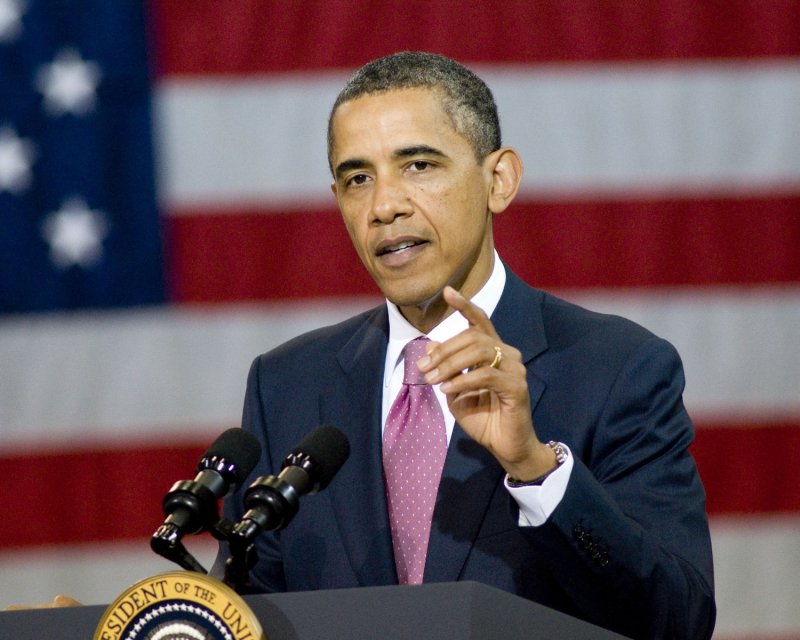President Barack Obama addresses invited guests at the National Robotics Engineering Center (NREC) at Carnegie Mellon University in Pittsburgh, Pennsylvania on June 24, 2011. UPI/Archie Carpenter |
License Photo
WASHINGTON, June 28 (UPI) -- House Speaker John Boehner Tuesday brushed aside pressure to raise the U.S. debt limit by Aug. 2, calling it an "artificial" deadline without dire consequence.
The Ohio Republican said failure to raise the debt limit above its current $14.3 trillion would not produce the catastrophic tremors to the U.S. and world economies Democrats and even some GOP economists predict.
"Nobody believes the United States is going to walk away from its obligations," Boehner said in an interview taped for the "Hannity" show on Fox News Channel. "Dealing with this debt problem and this deficit problem is far more important than meeting some artificial date created by the treasury secretary."
The heads of U.S. President Barack Obama's fiscal panel have suggested a compromise under which Democrats would agree to GOP lawmakers' demands for $2 trillion in spending cuts over 10 years.
The money would be a "down payment" on "a $4 trillion-plus, gimmick-free fiscal consolidation package that stabilizes and then reduces our debt as a share of the economy," Erskine Bowles, White House chief of staff in the Clinton administration, and former Sen. Alan Simpson, R-Wyo., said in an op-ed piece published in The Hill Tuesday.
A fiscal consolidation package is "what this country needs -- and what the American people deserve," they said.
Bowles and Simpson maintain a fiscal overhaul can't be done by the Aug. 2 deadline.
Hence, a two-part approach, they said.
Shortly after making the down payment, negotiators will have to work out the significant structural reforms, they said.
"And policy makers must agree -- including with an honest process and strict enforcement mechanisms -- to address the remainder of the problem before the next election," they said. "Elections take all options off the table, instead of setting the table for reform.
"There can be no more kicking the can down the road or handing the baton to the next guy. The markets won't allow it and the American people should not tolerate it."
The White House and congressional leaders of both parties had no immediate comment on the proposal.
Obama Monday stepped into bipartisan talks to work out a deal after negotiations led by Vice President Joe Biden broke down last week when Republicans insisted the administration take tax hikes off the table.
Republicans have said they will require slashing more than $2 trillion from the federal deficit before they will consider a separate need for Congress to raise the federal debt ceiling.
The 18-member National Commission on Fiscal Responsibility and Reform that Bowles and Simpson led released a draft plan after the 2010 midterm elections that called for domestic and military spending cuts starting in 2012.
It also proposed overhauling the tax code, ending or cutting $1 trillion a year in popular individual and corporate tax breaks and using the revenue to slash income-tax rates and cut the deficit.
In addition, it recommended hiking payroll taxes for the rich and cutting future benefits, in part by raising the retirement age for full benefits to 69 from 67 by 2075. It said these measures would make Social Security solvent for 75 years.
The overall plan would cut deficit spending $4.3 trillion over 10 years, the commission said.
The Obama administration largely ignored the proposals because they got only 11 commission-member votes in favor, not a 14-vote supermajority needed to formally recommend the blueprint to the White House and Congress.















